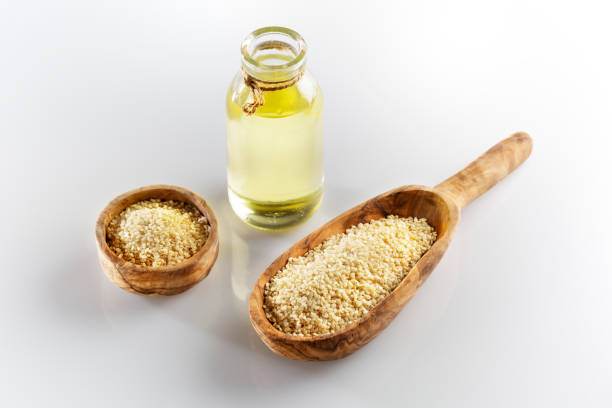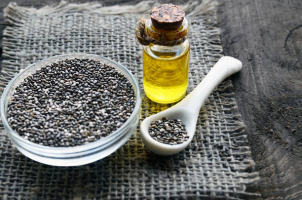Top 9 Health Benefits of Sesame Oil
You may be familiar with sesame seeds because they are commonly used in Asian cuisine. Sesame oil has a distinct nutty, aromatic flavor and, due to its ... read more...anti-inflammatory qualities, may be regarded as a healthier option than other vegetable oils. And here are the best sesame oil health benefits.
-
Sesamol and sesaminol, two antioxidants found in sesame oil, may have significant positive benefits on your health. Antioxidants are chemicals that lessen the harm that free radicals do to cells. Free radical buildup in your cells can result in inflammation and illness. Sesame oil supplementation provided protection against cardiac cell deterioration in a one-month investigation on rats.
In the same study, rats who received 2 or 5 ml of sesame oil per pound (5 or 10 ml per kg) of body weight daily had an increase in antioxidant activity. When used topically, sesame oil may have comparable benefits. It may lessen cell damage by preventing substances like xanthine oxidase and nitric oxide, which form free radicals, from doing their work, according to rat research.

High in antioxidants 
High in antioxidants -
It's crucial to reduce chronic inflammation as much as possible because it might be detrimental and cause sickness. Sesame oil has long been used in traditional Taiwanese medicine for its anti-inflammatory effects to treat joint pain, toothaches, and scrapes. Sesame oil can lower inflammation, which may be one of its key health advantages, according to more recent animal and test-tube research. For instance, research conducted in test tubes revealed that sesame oil decreased the generation of inflammatory indicators like nitric oxide.
Gingelly oil contains tyrosine, which has been directly linked to serotonin action in the brain. By supplying the body with happy hormones and enzymes, more movement may help improve mood. In other words, sesame oil may help you feel better and improve your mood if you are experiencing anxiety or despair.

Has strong anti-inflammatory properties 
Has strong anti-inflammatory properties -
Unsaturated fats are beneficial for heart health, according to a substantial body of studies. Unsaturated fatty acids make about 82 percent of the oil in sesame. It is very abundant in omega-6 fatty acids. Polyunsaturated fats, such as omega-6 fatty acids, are crucial to your diet and play a significant role in preventing heart disease.
Sesame oil may help prevent heart disease and even decrease the buildup of plaque in your arteries, according to rodent research. In fact, when used in place of oils heavy in saturated fats, it may even reduce your cholesterol levels. In a 1-month trial including 48 people, it was discovered that sesame oil consumption was associated with larger decreases in triglycerides and LDL (bad) cholesterol than olive oil consumption.

Good for your heart 
Good for your heart -
Sesame oil may be applied topically to burns and wounds in addition to being ingested for its health advantages. Natural gas with potential medicinal use is ozone. It was first used in a therapeutic setting in 1914 to treat infections during World War I. Various skin problems are treated topically with ozonated oils, which have had ozone added to them. Topical use of ozonated sesame oil was associated with increased collagen levels in injured tissue in one rat research. A structural protein called collagen is required for wound healing.
Although there is a dearth of human research in this area, other studies have shown that topical therapy with sesame oil decreased burn and wound healing time in mice. The oil's antioxidant and anti-inflammatory characteristics are probably what allows it to hasten the healing of wounds and burns.

May help heal wounds and burns 
May help heal wounds and burns -
The sesame seed oil has been demonstrated to have advantageous effects on the treatment and prevention of several malignancies, just like some other natural oils. Numerous studies have shown that the presence of the chemical molecule phytate in the oil inhibits the growth and development of malignant cells.
Similar to how high calcium concentrations can help lower the risk of colon cancer, high magnesium concentrations found in sesame oil may likewise lower the risk of colorectal cancer. Numerous studies have shown that sesamin and sesamol, two components of sesame oil, can cause apoptosis, or the death of cancer cells, in a variety of cancer types, including breast, colon, lung, leukemia, and pancreatic cancer.

May have anticancer potential 
May have anticancer potential -
Because so many individuals experience the signs of anxiety and sadness, having a natural drug that may aid with these symptoms could be quite beneficial for many people. Tyrosine, a vitamin included in sesame oil, has been investigated and found to have a relationship with the brain chemical serotonin. With the aid of the appropriate enzymes and hormones, serotonin activity helps elevate a person's mood and improve happiness. As a result, sesame seed oil consumption may aid those who experience anxiety or sadness in feeling happier.
Having said that, natural oils like these have not been sufficiently investigated to be used in lieu of any pharmaceuticals that a doctor, therapist, or psychiatrist may have recommended for you. Before taking sesame oil for this purpose in these circumstances, you should see your doctor. They may be able to work with you to carefully determine whether the substance has any good benefits aside from your prescription medication.

Benefit your mood 
Benefit your mood -
Additionally, copper has natural anti-inflammatory effects that can strengthen your bones and help cure illnesses like gout or arthritis by lowering swelling. In light of the foregoing, sesame seed oil can also benefit overall bone health. Sesame oil contains several minerals, including calcium, copper, and zinc, all of which are necessary for the growth of strong bones. As a result, the oil can aid in the quick recovery of bone regeneration and the avoidance of diseases like osteoporosis as well as other age-related bone deficiencies.
Because of its potential to whiten teeth, decrease dental plaque, and guard against certain diseases, sesame oil has also frequently been used to promote improved oral health. Sesame oil is a fantastic natural cure for treating dental infections or gingivitis and calming sore gums or cheeks since it possesses antibacterial and anti-inflammatory effects.

Improve bone and oral health 
Improve bone and oral health -
Given that gingelly oil is derived from sesame seeds, which are high in zinc, it could be zinc-rich. One of the most crucial elements for your skin is zinc. It could improve skin smoothness and suppleness while lowering oxidative stress, which would help lessen the visibility of age spots and premature aging. According to a 2018 study by scientists at California State University, US, using sesame oil topically on the skin may help form a barrier and shield skin from damaging UV radiation. Sesame oil has also been utilized in some locations to treat skin fungus problems.
Research that was published in Pharmacognosy Reviews suggests that sesame oil may have historically been utilized to enhance the health of hair. According to a 2014 study on the bioactive elements of black sesame oil, it may help maintain natural hair color and reduce hair loss. Additionally, gingelly oil's anti-bacterial properties might aid in getting rid of any infections or other objects that can harm your scalp or hair.

May aid in skin care 
May aid in skin care -
For diabetics, in particular, proper blood sugar management may be supported by sesame oil. According to one study, feeding diabetic rats a diet containing 6 percent sesame oil for 42 days led to noticeably lower blood sugar levels than feeding the oil-free animals. Sesame oil may potentially aid in the long-term control of blood sugar. Sesame oil was reported to significantly lower fasting blood sugar and hemoglobin A1c (HbA1c) compared to a placebo group in a trial of 46 persons with type 2 diabetes. A measure of long-term blood sugar management is the HbA1c level.
Nearly 15% of people have osteoarthritis, which is a significant source of joint discomfort. Sesame oil has been associated with reductions in arthritic symptoms in a number of mouse studies. In one 28-day trial, rats were given the oil at daily dosages of 0.5 milliliters for every pound (1 milliliter for every kilogram) of body weight. The rats showed a decrease in arthritic symptoms such as joint pain and oxidative stress indicators. Sesame oil may relieve arthritic symptoms, according to animal studies, but the further human study is required.

May help control blood sugar and help treat arthritis 
May help control blood sugar and help treat arthritis






























